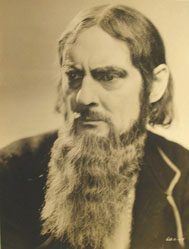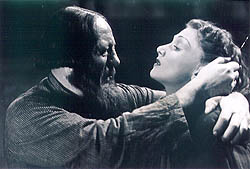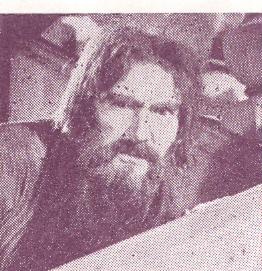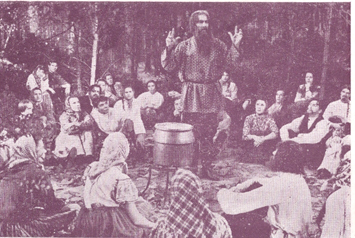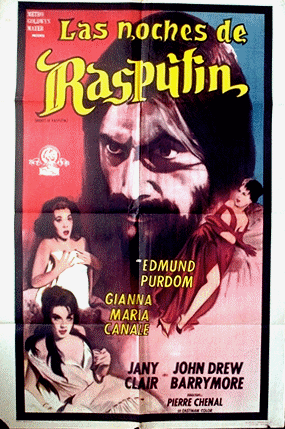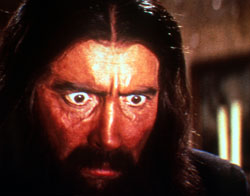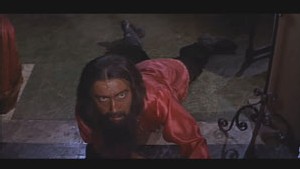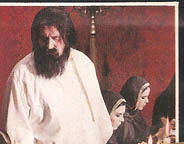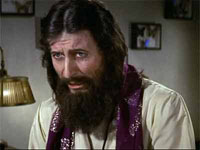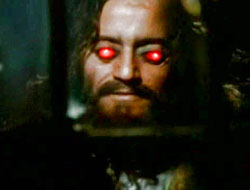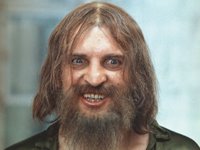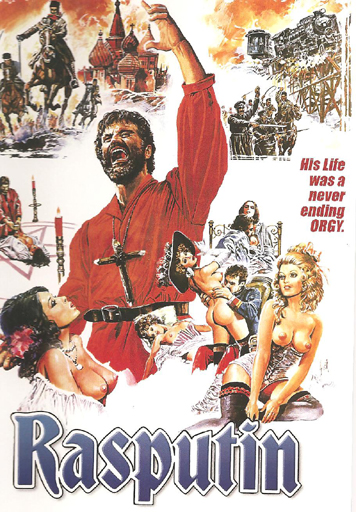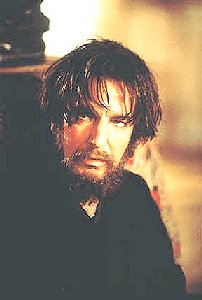 |
 |
|
CINEMATIC SHADES OF RASPUTIN By Keith J. Crocker
Allow me to take a moment to profess my admiration of Rasputin. I am by no means a scholar on Rasputin, but from the information I have gathered in the many years of reading up on him I have ascertained that Rasputin is what I'd term as a master, a sage, a wise man that saw things the way they should be versus how they are. When men like this begin to preach, they are assassinated, Christ being the perfect example of this. Rasputin, the man, really meant to bring only joy to all peoples of the world. Rasputin, the human, liked to party to excess, he loved women, he loved attention, it made him all the more vulnerable, his weakness would be his downfall. Rasputin, the legend, is a larger than life piece of a puzzle that accidentally fell into a fractured country that attempting to heal but never really dressed it wounds right and developed gangrene... Cinematic adaptions of the Rasputin story begin right after his death in 1916. One of the first was Rasputin, The Black Monk (1917), which starred Montagu Love as Rasputin (and a young Henry Werewolf of London Hull as Kerensky). Directed by Arthur Ashley, its an American film of which little is known for the film has fallen off the face of the earth. So for our purposes we are going to begin with Rasputin, The Holy Devil (1928), a German film directed by the left wing leaning Martin Berger. What this film has in its favor is actor Nicolai Malikoff , an authentic Russian actor who bears an uncanny resemblance to Rasputin. Being a German film, the film takes a sympathetic view of Rasputin, as it appears that the Germans viewed Rasputin as a natural healer, a man who uses nature for medicinal purposes as opposed to doctors using medical science. That concept of going back to nature was very popular in Germany at the time, and would be adopted by the Nazi party, particularly by the SS, the more theoretical branch of the SA. Also in the cast of this film is Max Schreck, that's right, Nosferatu himself in the role of Archduke Nicholas. Despite how good Malikoff looks as Rasputin, Berger's politics get in the way as the film spends more time lampooning Russia Royalty than it does exploring Rasputin's character. There is some nice cinematic montages that harken back to German expressionism and Russian resurgence (as exemplified by Eisenstein), but as a whole the film falls short of being a true open expose of Rasputin himself. Actor Jac Trevor is fantastic as Yussoupov, the asshole who assassinated Rasputin. Recent facts have uncovered that Yussoupov was a homosexual and may very well have agreed to murder Rasputin due more to the concept that Rasputin rebuffed him sexually rather than to save Russia from the crazed holy man. This film plays up the Fag concept beautifully, with this subject being raised again only in Nicholas and Alexandra (1971). Another film about Rasputin was made in Germany the same year, Dornenweg einer Furstin (1928) but it has yet to surface in any format hence I cannot comment on it at this time.
Now, at the same time the Germans were shooting their take on good old Gregori, the Americans were cranking out the story of Rasputin in only the grandest of Hollywood tradition. Called Rasputin and the Empress (1932) this film stars the Royal Family of Stage and Screen, the Barrymores. Lionel Barrymore (my personal favorite of the whole family) plays Rasputin with Southern spitfire. You may ask why I say that and my answer is that Lionel literally spends a good deal of the time in the film yelping and yahooing like one of the backwoods mutants from Deliverance. He comes off more like one of the weird street people you might meet in New Orleans trying to offer you salvation for your soul. He's just too American, there is nothing Russian about him. Brother John and sister Ethel turn in acceptable performances as Prince Chegodieff and Czarina Alexandra, but Lionel overshadows them with his insane redneck impression of Rasputin. He's really a pleasure to watch but yet he's miles away from what Rasputin was said to be like. The only factor that ties him to Rasputin was that Lionel had a love of life and his energy shows through in just about every performance he ever gave. Rasputin also had a love of life and perhaps shared the same enthusiasm that Lionel had, both were the type of guys that could light up a room. Directed by the famed Polish director Richard Boleslawski (Boleslawski was one of the first to teach method acting in the US along with Maria Wolfman Openskaya), the screenplay, written by Charles Mac Arthur, has with it a general distrust of Rasputin, the very same distrust the British will blow out of proportion in later years with Rasputin, The Mad Monk. MacArthur had a father who was an evangelist and it's possible that he viewed religious zealots as something worth worrying about, hence the film treats the tragedy that would befall Russia as something directly related to Rasputin. This is a fun film but it sidesteps history in favor of dramatic storytelling, which in itself is offset by Lionel's over the top Pa Kettle Gregori.
The next Rasputin adaption comes from France. Titled Rasputin, La Tragedie Imperiale (1938), the film lifts its imagery and tone from the '32 film with Veidt, and goes even further in its production design, which is grand in the best Hollywood tradition. French actor Henry Baur plays Rasputin and does a fine job of mixing the sympathetic and likable side with the power mad ambition that leads to the monk's downfall. Baur himself was tortured to death by the Gestapo in 1943 because they believed his wife was a Jew who had conspired with the resistance. The tendency of the French filmmaker is similar to the Germans in that it tends to show Rasputin in a sympathetic light and makes the assassination seem so unjustified that it literally makes Rasputin into a martyr. Also, the Revolution that followed the death of Rasputin is seen in a much more romantic light by the French, who love to uphold the attitude that they are the leaders in all thing progressive and revolutionary, when in reality their own French revolution was the most pointless and bloody of all the revolutions, and changed nothing in the long run. One of the most striking images in this film is the shot of Rasputin's blood staining the fresh snow underneath his very feet. His bloodied hand leaves the tell tale imprint of murder in the fluffy white snow, with snow representing the purity and the blood being the stain of mankind and its ability to destroy anything sacred. Seeing this sequence, one is made aware of the power of cinematic violence and how long gore in films has been with us. This scene in its power is similar to Eisenstein's use of blood in Battleship Potemkin. Another interesting note in regards to this film's sympathetic treatment towards the monk is that it was in fact written by two Germans, Max Glass and Alfred Nuemann. Its direction is by Marcel L'Herbier, who is credited with inventing the Institut des Hautes Etudes Cinématographiques (IDHEC) in 1943. This school had radical approaches to film theory and was home to directors such as Louise Malle and Costa-Gavras.
Now, the next adaption of the Rasputin story really stands out due to its musical number which appears midway through the film. Called Raspoutine (1954), this French/Italian co-production was shot in color and has an atmosphere that one can only describe as whimsical. No, it's not a comedy, but any time you have a musical number in which Rasputin sings to a group of peasants and they all break out in song and dance, it suddenly changes the tone of the film and one is reminded of the lighthearted 50's musicals that dominated the screens of the time. The Eastman color photography really does change the focus of the story in that B/W photography is a metaphor for the good and bad of any character a cinematic story is choosing to highlight. The colors here literally distract the viewer and instead put our emphasis on things such as clothing, production design, environmental condition, everything but Rasputin and his story. Regardless, this film is quite rare and certainly the first Rasputin film shot in color, so not only does it give it historical significance but the production design is a treat for the eyes. The reds in particular stand out, and the costumes are so lush one literally favors the visuals over the story. It is just as well as we really haven't progressed story-wise since the 1928 film and the whole thing is in danger of getting stale. It doesn't mean that the Rasputin story is not open to musical treatment, as singing and dancing was something Rasputin held dear. In almost every version of the story, Rasputin can be seen doing a jig or two during some bouts of heavy liquor consumption in the local watering hall. Also, there have been stage adaptions of the story and even an opera has been written and performed as well. But the odd musical interlude in this film brings it into the Walt Disney "zippity do dah" school of the surreal.
One of the next glimpses of Rasputin comes from American TV. The 1956 half hour CBS broadcast of The Black Prophet, starring Boris Karloff and Leslie Nielson, is about as interesting as live TV could get. While Karloff does a splendid job of creating a sympathetic Rasputin (his look is similar to the appearance he'd have in Bava's Black Sabbath), Leslie Nielson's assassin is still played with way too much heroic bravado to be able to link this particular adaption of the story into a pro Rasputin rhetoric. Regardless, Karloff adds pathos and insight, obviously he respects the character he plays, which is more than can be said for Christopher Lee's portrayal in the Hammer horror Rasputin, The Mad Monk. As I stated, Nielson is way too masculine to do any justice to the fem Yousoupov. Plus, Nielson is now so identified with comedy that one can't help but break into a smile while watching him perform.
One of the more interesting Rasputins to emerge cinematically was Edmund Purdom in the Italian/French co-production The Night They Killed Rasputin (1961). This film's highlight is that it has a huge air of tragedy that wafts through the film. When it ends one can't help feel that they've witnessed a tremendous useless and violent death, and despite the fact that Rasputin clearly has abused his privileges, one can't help but feel sorry about the outcome. Purdom's Rasputin is joyous, kind of like that that crazy uncle who you love so dearly but the family as a whole doesn't trust. The hot Gina Maria Canale is the Czarina, and the films focuses more on Rasputin's sexual appetite rather then the violence of his comeuppance. This film was advertised with sex as being the emphasis, but by today's standards it's quite innocent. John Drew Barrymore is Yousoupov, and his good looks and boyish charm removes the predatory homo angle so important to the story. In fact at one point he even brandishes a guitar and sings a Russian folk song, sort of like a Phil Ochs in the military. The scene is silly and most likely it's someone else providing the song. Shot in Eastmancolor, the only prints available to the America's were 16mm B/W TV prints. I also carry a German language Eastmancolor version that is ultra rare, you can get this right HERE!
The next Rasputin film, and my personal favorite, is perhaps the most anti-Rasputin piece ever committed to celluloid. Of course, I'm talking about Hammer's Rasputin, the Mad Monk, directed in 1965 by Don Sharp. Not at all historically accurate, this is a typical Hammer horror film, it replaces Dracula with Rasputin, only it has Rasputin playing Dracula. What I mean is that Christopher Lee, who plays Rasputin, was well known for playing Dracula, and has continued to play Dracula in just about every film that he's in. Even when he's not playing Dracula, he is... Anyhow, the surreal, ridiculous screenplay by Anthony Hinds has Lee's Rasputin literally hypnotizing his way into the Royal Court, purposely hurting the Czar's son so that the court must keep him in power to heal the kid. He is cruel to women, and even causes Sonia (Barbara Shelley), sister of Dr. Zargo, to commit suicide. He is so powerful that the neither the poisor nor the knife won't kill him, he literally has to be tossed out a window to his death before he succumbs. As horror theater goes, it's brilliant. As history goes, it's stupid beyond comprehension. As far as politics go, it is totally sympathetic to the Russian crown. The British fear things like revolution and overthrow, so it's obvious that they blame Rasputin for the revolution, God forbid anyone should think that the weak Czar had anything to do with it. But those Peasant Monks, those are the guys you should keep your eyes on. Christopher Lee has a field day playing Rasputin as a fucking lunatic who chops off men's hands, throws acid in the Court Physician's face, and literally makes a mess of Russian Royalty. Lee once said in an interview what a pleasure it was for him to have meet Yousoupov when he was a young man. If Yousoupov had had a few minutes with the young Lee alone, he most likely would have molested him. You know, I like Lee as an actor, but I hate him as a person. He's rude, arrogant, and snide. He embodies the elitist British mind set better than any other actor I could think of (Charles Laughton and Henry Daniel also do this well, but word has it that they were very decent men despite their roles which weren't always complimentary). His Rasputin is so over the top that you can't help but like the portrayal, and the film is so beautifully paced that as far as horror cinema goes, this is Hammer at it's finest. My only complaint is that Rasputin's death scene goes by way to quick. It has been said that a very elaborate death scene was shot but later cut down for reasons related to running time. Don Sharp, who is a hit and miss type of director, really goes to town with this film, creating some really decent atmosphere and presenting us with one hell of a kick ass Rasputin. It's interesting because I recently saw Sharp's film Henessey, which involves the IRA and stars Rod Stieger, and Stieger was very subdued in this film. I'm not sure if Sharp felt that this subject matter was too serious to be played in the same absurd manner that his Rasputin was played in, but the lack of silly overacting that I was expecting from Stieger actually somewhat disappointed me. The interesting thing here is that while attempting to make Rasputin look like a monster, they instead made him into a super cool, super man James Bond type villain, which in turn would increase his popularity among young males in their teens and twenties. Talk about backfiring!
I guess that the worst cinematic adaption of the Rasputin story is 1967's I Killed Rasputin, a Belgium production that is perhaps one of the all time cures for insomnia. Rasputin is played by the usually very enjoyable Gert Frobe (Goldfinger), a German character actor who livens up just about any film that he's in. No matter how great Frobe is, he can't save this nonsense. It's a film that literally lumbers from one scene to the next, absolutely nothing happens. There are no points being made, no new ground being covered, just silly costume drama crap that will have you begging for Christopher Lee. This flick was very popular during the early days of video, the promising box leading us to believe that we are going to see all the juicy details of Rasputin's life and death, only to be lulled to sleep by a film that moves as fast as a garden slug. The only thing that most of us remember about this film is the video tape starting to rewind and waking us out of a good, well deserved nap...
We next see Rasputin in the British made epic Nicholas and Alexandra (1971). Certainly, the film focuses on Czar Nicholas and Czarina Alexandra, and Rasputin is more or less one of many characters that affect the Czar's life. Tom Baker of Dr. Who fame plays Rasputin, and he is truly an imposing figure. Yet, despite this being a British production, his role in bringing down the Russian royalty is not overplayed and he's actually looked upon as more of an oddball than say a monster. But what really shines here is Yousoupov, here played by Martin Potter. He is played as a glam queen, you've never seen a bigger faggot in your whole life. Arrogant, snide, and brimming with hate, delighting in his sneaky attack on Rasputin only to have his hatred fueled even more by Rasputin's lack of desire to die. In fact, Rasputin hurls insults at Yousoupov which results in not only Rasputin being shot, but being beaten to death with a chain, a fact left out of most adaptions of the story. A film with a running time of 189 minutes, and an eye aimed at trying to be as historically accurate as possible, Nicholas and Alexandra is an acquired taste but a truly enriching film if you're a fan of historical drama.
Ok, for a moment here I have to break off to speak of a film that features a Rasputin like character. Now, I'm breaking the flow by doing this because the guy isn't supposed to be Rasputin per se, but the character is clearly modeled on Rasputin. The film I speak of is one of my all time favorite horror films, Horror Express (1974). Directed by Eugenio Martin, this is one hell of a movie, perhaps one of the best paced films I've ever seen. Alberto De Mendoza, a fine character actor from Argentina, plays Father Pujardov, house monk to Count Petrovski (Jorge Rigaud). In the film, De Mendoza plays his character as a true religious fanatic, he believe that the murders being committed are the work of the devil, though it's actually an earth bound alien draining people's brains in an effort to find a way to return home. When the monk actually confronts the alien, he's so in awe of the creature's power that he offers his own body for the creature to inhabit, convinced that it's some kind of a divine entity. At that point in the film, the monk goes from being Petrovski's cabin boy to a vengeful monster. Complete with glowing eyes, he literally massacres the bulk of the trains passengers. The best scene by far is when the monk comes up against Captain Kazan, played in an over the top performance by Telly Savallas. He's a Cossack with an attitude and when the monk shames him, he whips the guy to near death. When De Mendoza gives himself over to the alien, it finally gives him the upper hand and a chance at revenge. And revenge he does get! Mendoza is made up to replicate Rasputin so much so that if it wasn't for the character having a different name, you'd swear that it was supposed to be Rasputin.
1981 saw the stateside release of a Russian film directed in 1975 by Elem Klimov called Agony. The film was banned in Russia because it was believed that Klimov showed the Czar in a too sympathetic light. And while the film is still obviously a propaganda picture in that it paints Rasputin as a total lunatic prone to fits of delusion while the Russian Royalty is shown with nothing but contempt, the movie is still well worth seeing in that it's a Russian view of Russia's own events. It's also spiced up with authentic newsreel footage from the time. An excellent performance by Aleksei Petrenko as an over the top Manson type Rasputin makes this film shine, though Klimov will excel with the horrific but beautiful Come and See (1985).
In 1984 we got another view of Rasputin from Germany, this flick in fact give us quite a few different views of Rasputin, some we may not want to see! A big budget porn film, this entry was made in an attempt to compete with Bob Gucciones Caligula (1979). Caligula played for many years, both as a hardcore offering and a cut down soft core show. I'll never forget attempting to bring my girlfriend to see Caligula during it's soft core run at the local multiplex. The woman at the ticket booth berated me for bringing a young girl to see this movie. "What kind of a boyfriend would subject a young girl to a film like this" she said. Haaa, this women didn't know me. I showed my girlfriend a naughty xxx rated film called Little Girls Blue (1978) on video tape. Anyhow, I argued that the film was cut and didn't have any hardcore but they didn't want to hear it and refused me a ticket. I guess we were both around 17 and not quite the age to get entry into this "unrated" edition. Since we were turned away I took my girlfriend home and fucked the living daylights out of her. That will teach them. Here they tried to keep this girl from getting corrupted and I ended up violating her. I would have a similar problem many years later trying to see Cannibal Holocaust, the guard at the door treated it as if it was XXX and wouldn't let me in despite the fact that I was 20 Years Old! Back in those days people cared. It was annoying then but now I look back upon it with fondness. Today they'd let a five year old into a snuff film. As long as they can overcharge you for popcorn, you've got a seat. Anyhow, getting back to this Rasputin, it was clearly an attempt to replicate the success of Caligula. Called Rasputin - Orgien Am Zarenhof (Orgies in the Czars Court), Rasputin (Alexander Conte) looks a lot like comedian Chris Elliot. Also, he acts as a sort of partisan for the peasants (?)...Whenever a peasant is being whipped or beaten by a cossack, Rasputin pops up and shoots the cossacks down (???) Furthermore, he goes to the Palace and fucks all the ladies in waiting. He fucks them and blows his load in their faces, John Leslie style! No, I'm not making this up. They don't just try to kill him once, they try it several times. And at the end of the film he's still living, running the Palace like it's his own. The violence is outrageous in this film, whippings, burnings, shootings in the head, you name it, it's there. And did I mention it runs two fucking hours. I shit you not! It was apparently made back to back with a film about Catherine the Great called Katharina Die Nackte Zarin (which I also carry in a soft core version in German). Directed by Ernst Hofbauer, this is the most unusual view of the Rasputin story ever told, and is a must for your collection.
The final entry in this piece is the 1996 British production entitled Rasputin, which was done for HBO. Of all the films covered here, it's my opinion that this is perhaps the most authentic version of the story, with Nicholas and Alexandra coming in a close second. Allan Rickman is a fantastic Rasputin, covering the full spectrum of a loving man, confused saint, power mad madman, and last but not least, victim. For my money, this rather expensive but beautifully shot picture could pretty much be the final word on Rasputin, that is if you're basing the story on real life and what we know about it. But as far as the interpretations of Rasputin and his legend, I'm sure there is much more to come. The recent Hellboy films feature Rasputin as a bad guy. A film called Conspiracy was made in Russia in 2007 and though I have yet to see it, it focuses on Rasputin and a conspiracy by the British for taking control of Russia. In 2009, I hope to start and complete my screenplay on a film I've been dreaming about making on a resurrected Rasputin and his journey to America in the 1950's. And even though I hate sequels, would you believe I already have a sequel in mind... IF YOU LIKE THIS ARTICLE, CHECK OUT HEATHER'S SIDEBAR
THE END
|
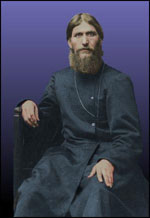 Ever since I was a young man, I had a fascination with Rasputin. Back in the late seventies Saturday Night Live did a spoof of Rasputin's death
with John Balushi playing the monk who despite endless attempts at taking his life would not die. Believe it or not, a simple stupid sketch like the one on Saturday Night Live only fueled my fire and desire to know more about this undying holy man who ultimately was the final turn of the screw in the end of imperial Russia and the rise of revolutionary Russia. How could one man have led to so much change? Why was this man so dangerous that it took a royal conspiracy to bring him down? What would have happened if he had not been assassinated? So many questions, and most likely so many answers.
Ever since I was a young man, I had a fascination with Rasputin. Back in the late seventies Saturday Night Live did a spoof of Rasputin's death
with John Balushi playing the monk who despite endless attempts at taking his life would not die. Believe it or not, a simple stupid sketch like the one on Saturday Night Live only fueled my fire and desire to know more about this undying holy man who ultimately was the final turn of the screw in the end of imperial Russia and the rise of revolutionary Russia. How could one man have led to so much change? Why was this man so dangerous that it took a royal conspiracy to bring him down? What would have happened if he had not been assassinated? So many questions, and most likely so many answers.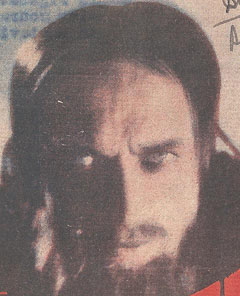 In 1932, Germany gives us
In 1932, Germany gives us 